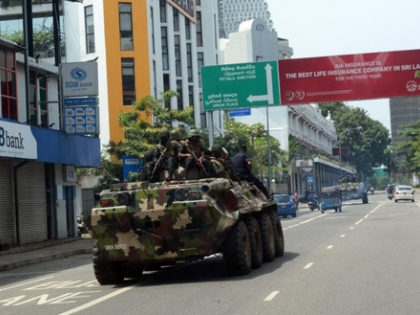Sri Lanka's tax policies fueled 2022 economic crisis, hit education funding: Rights body
By IANS | Updated: October 15, 2025 10:45 IST2025-10-15T10:44:31+5:302025-10-15T10:45:19+5:30
New York, Oct 15 Human Rights Watch (HRW), a US-based advocacy group, has revealed that Sri Lanka's tax ...

Sri Lanka's tax policies fueled 2022 economic crisis, hit education funding: Rights body
New York, Oct 15 Human Rights Watch (HRW), a US-based advocacy group, has revealed that Sri Lanka's tax policies played a driving role in the country's devastating 2022 economic crisis and have contributed to the chronic underfunding of education and other public services.
In its 101-page report, titled 'Tax Giveaways, Struggling Schools: How Low Taxes Drove Sri Lanka's Economic Crisis and Squandered its Education Lead', the HRW described how successive Sri Lankan governments adopted policies that resulted in inadequate revenues.
These policies, the rights body said, contributed not only to Sri Lanka's defaulting on its debt but also to a decades-long decline in public education spending as a share of Gross Domestic Product (GDP), leaving it among the lowest in the world.
"For decades, Sri Lanka has been hostage to economic policies that starve its government of revenue and reflect a myopic focus on GDP growth," said Sarah Saadoun, senior economic justice researcher at HRW.
"In practice, that means education spending has fallen well behind the pace of growth, turning the country from a global leader in public education to a laggard," she added.
The report highlighted how education illustrates a broader neglect of social spending, with the wasted potential most evident in the sector where Sri Lanka was once widely regarded as a global leader.
According to the HRW, Sri Lanka's new government has taken some positive steps, such as providing Sri Lankan Rupees 6,000 (about $20) bursary to some families to help with education-related costs, but it has only marginally raised the education budget.
"It should continue to increase the education budget, with a goal of reaching the internationally agreed benchmark of 4 to 6 per cent of GDP allocated to education," the rights body stated.
The HRW urged the Sri Lankan government, led by President Anura Kumara Dissanayake, to urgently adopt measures to uphold its human rights obligations and enact reforms to a system that presently favours companies and wealthy people while failing to deliver adequate revenues.
"Sri Lanka's economic quagmire makes clear that growth alone is not enough to fulfil human rights," said HRW senior researcher Saadoun.
"The government should finally establish a progressive tax system and use its income so that it adequately funds education and other public services that benefit all Sri Lankans," she stressed.
Disclaimer: This post has been auto-published from an agency feed without any modifications to the text and has not been reviewed by an editor
Open in app